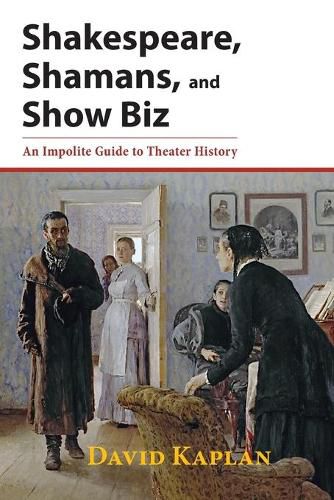Readings Newsletter
Become a Readings Member to make your shopping experience even easier.
Sign in or sign up for free!
You’re not far away from qualifying for FREE standard shipping within Australia
You’ve qualified for FREE standard shipping within Australia
The cart is loading…






This title is printed to order. This book may have been self-published. If so, we cannot guarantee the quality of the content. In the main most books will have gone through the editing process however some may not. We therefore suggest that you be aware of this before ordering this book. If in doubt check either the author or publisher’s details as we are unable to accept any returns unless they are faulty. Please contact us if you have any questions.
In twenty-four chapters David Kaplan offers ideas, opinions, theories, and facts for someone who wants to be a theater artist today in hopes of creating their own vision of theater-making, one informed by, and in the context of, theater history. This book explores what theater artists have done before and what they, inspired by history, might do next.
A non-lineal theater history, Shakespeare Shamans, and Show Biz explores theater as a shaman’s vision, as a storyteller’s heritage, as religious propaganda, as a mirror of life, as a critique of society, as a prompt for hard laughter, as fantasy, and as national epic, with plays as different (and the same) as the writings of August Wilson, Gertrude Stein, Shakespeare, and people who never made it into history.
Each chapter explores a particular theme: The Middle Ages as a State of Mind,
Commedia dell'arte and Moliere,
Shakespeare-To Begin,
Euripides-Forever Modern,
Aeschylus-Writing in an Age of Certainty,
Sophocles and Aristotle-Defining Tragedy,
Greek Comedy,
Roman Theater,
Asian Classics and Rules (Bunrakuken, Chikamatsu, Zeami), China-The Pear Garden and the Red Pear Garden,
Neoclassic Theater and Why There is Such a Thing,
Shakespeare’s Classic,
Bad Boys Breaking the Rules (Brecht, Ibsen, and Jarry), Inside Outside (Ibsen, Strindberg, Turgenev, Stanislavsky, Chekhov, Antoine), Beyond Illusion (Appia, Craig, Poel), Melodrama and Popular Theater in America (Aiken, Brice, Cohan, Stone, Tyler, Bert Williams), American Classic: Eugene O'Neill and Martha Graham,
Expressionism to Epic (Brecht, Meyerhold, O'Neill, Piscator, Treadwell), American Agitprop: Overt and Disguised (Adler, Clurman, Flanagan, Kazan, Le Gallienne, Miller, Odets, Robeson, Strasberg, Wilder), Poetry of the Theater (Artaud, Breton, Cocteau, Ionesco, Kharms, Stein), Personal Mythology (Genet, Lorca, Mishima, Strindberg), Two Masters: Samuel Becket and Tennessee Williams,
Theater of Identity (Baraka, Ensler, Kramer, Wilson), and Missing from History (Bonner, Fornes, Kennedy, Maeterlinck).
$9.00 standard shipping within Australia
FREE standard shipping within Australia for orders over $100.00
Express & International shipping calculated at checkout
This title is printed to order. This book may have been self-published. If so, we cannot guarantee the quality of the content. In the main most books will have gone through the editing process however some may not. We therefore suggest that you be aware of this before ordering this book. If in doubt check either the author or publisher’s details as we are unable to accept any returns unless they are faulty. Please contact us if you have any questions.
In twenty-four chapters David Kaplan offers ideas, opinions, theories, and facts for someone who wants to be a theater artist today in hopes of creating their own vision of theater-making, one informed by, and in the context of, theater history. This book explores what theater artists have done before and what they, inspired by history, might do next.
A non-lineal theater history, Shakespeare Shamans, and Show Biz explores theater as a shaman’s vision, as a storyteller’s heritage, as religious propaganda, as a mirror of life, as a critique of society, as a prompt for hard laughter, as fantasy, and as national epic, with plays as different (and the same) as the writings of August Wilson, Gertrude Stein, Shakespeare, and people who never made it into history.
Each chapter explores a particular theme: The Middle Ages as a State of Mind,
Commedia dell'arte and Moliere,
Shakespeare-To Begin,
Euripides-Forever Modern,
Aeschylus-Writing in an Age of Certainty,
Sophocles and Aristotle-Defining Tragedy,
Greek Comedy,
Roman Theater,
Asian Classics and Rules (Bunrakuken, Chikamatsu, Zeami), China-The Pear Garden and the Red Pear Garden,
Neoclassic Theater and Why There is Such a Thing,
Shakespeare’s Classic,
Bad Boys Breaking the Rules (Brecht, Ibsen, and Jarry), Inside Outside (Ibsen, Strindberg, Turgenev, Stanislavsky, Chekhov, Antoine), Beyond Illusion (Appia, Craig, Poel), Melodrama and Popular Theater in America (Aiken, Brice, Cohan, Stone, Tyler, Bert Williams), American Classic: Eugene O'Neill and Martha Graham,
Expressionism to Epic (Brecht, Meyerhold, O'Neill, Piscator, Treadwell), American Agitprop: Overt and Disguised (Adler, Clurman, Flanagan, Kazan, Le Gallienne, Miller, Odets, Robeson, Strasberg, Wilder), Poetry of the Theater (Artaud, Breton, Cocteau, Ionesco, Kharms, Stein), Personal Mythology (Genet, Lorca, Mishima, Strindberg), Two Masters: Samuel Becket and Tennessee Williams,
Theater of Identity (Baraka, Ensler, Kramer, Wilson), and Missing from History (Bonner, Fornes, Kennedy, Maeterlinck).